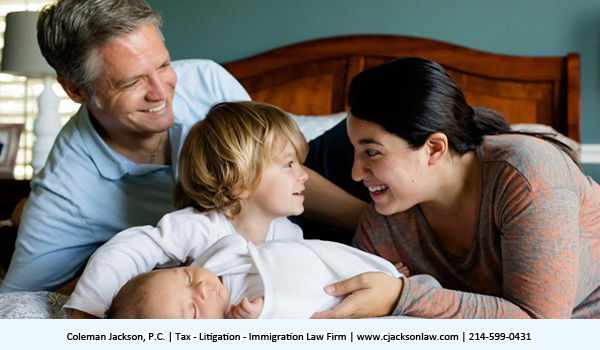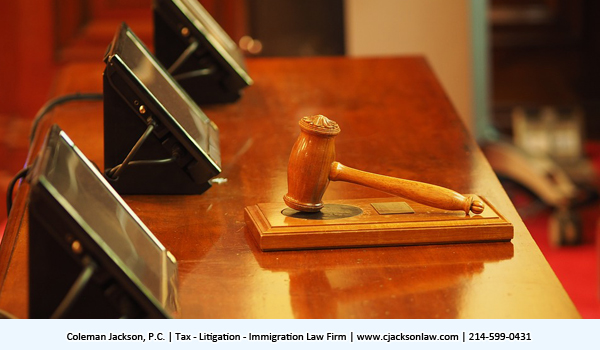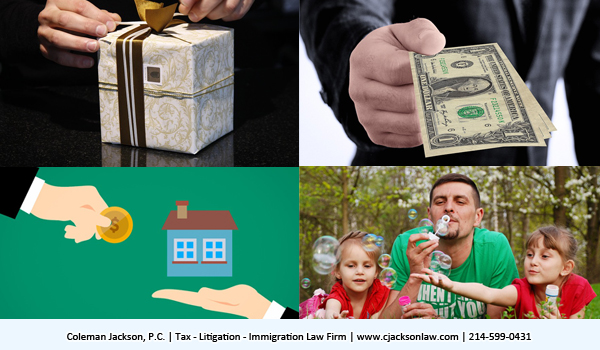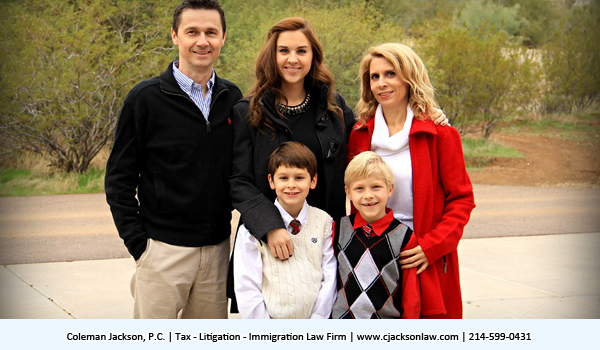Coleman Jackson, P.C. | Transcript of Legal Thoughts
Published June 27, 2022
Legal Thoughts is an audiocast presentation by Coleman Jackson, P.C., a law firm based in Dallas, Texas serving individuals, businesses, and agencies from around the world in taxation, litigation, and immigration legal matters.
This episode of Legal Thoughts is an audiocast where the Attorney, Coleman Jackson is being interviewed Alexis Brewer, Tax Legal Assistant of Coleman Jackson, P.C. The topic of discussion is “Pandemic-Related Changes to the Child Tax Credit That Are Likely to End”. You can listen to this podcast by clicking here:
If you enjoy this podcast, make sure to stay tuned for more episodes from the taxation, litigation, and immigration Law Firm of Coleman Jackson, P.C. Be sure to subscribe. Visit the taxation, litigation and immigration law firm of Coleman Jackson, P.C. online at www.cjacksonlaw.com.
TRANSCRIPT:
ATTORNEY: Coleman Jackson
LEGAL THOUGHTS
COLEMAN JACKSON, ATTORNEY & COUNSELOR AT LAW
ATTORNEY: Coleman Jackson
Welcome to Legal Thoughts
My name is Coleman Jackson and I am an attorney at Coleman Jackson, P.C., a taxation, litigation and immigration law firm based in Dallas, Texas.
In addition to myself, we have Alexis Brewer – Tax Legal Assistant, Leiliane Godeiro – Litigation Legal Assistant, Gladys Marcos – Immigration Legal Assistant, and Johanna Powell – Tax Legal Assistant.
On today’s “Legal Thoughts” podcast, our Tax Legal Assistant, Alexis Brewer, will be interviewing me on the important topic of: “The Child Tax Credit,” specifically, the “Pandemic-Related Changes to the Credit That Are Likely to End.”
INTERVIEWER: Alexis Brewer, Tax Legal Assistant
Hi everyone, my name is Alexis Brewer and I am a Tax Legal Assistant at the tax, litigation and immigration law firm of Coleman Jackson, Professional Corporation. Our law firm is located at 6060 North Central Expressway, Suite 620, right here in Dallas, Texas.
Good afternoon, Attorney; thank you for agreeing to sit with me as I interview you with respect to this hot tax topic: “Pandemic Related Child Tax Credit Changes Are Likely to End”.
Let’s jump right in,
Question 1: What is the Child Tax Credit and why was it created by the U.S. Congress?
Attorney Answer – Question 1:
Hello Alexis.
The Child Tax Credit (CTC) is a tax credit granted to taxpayers with qualifying children. The Child Tax Credit was implemented almost 30 years ago, and was designed to provide assistance to lower-income and middle-income families raising children.
The credit aims to reduce tax liability and, in some cases, entitles taxpayers to claim a tax refund despite otherwise not being required to file a tax return.
This Refundable portion of the Child Tax Credit is known as the “Additional Child Tax Credit”
INTERVIEWER: Alexis Brewer, Tax Legal Assistant
That leads me right into my next question –
Question 2: What are tax credits and why are they beneficial to American taxpayers?
Attorney Answer – Question 2:
That’s a great question.
Tax credits are used to benefit taxpayers by reducing dollar-for-dollar the amount of federal income taxes owed.
Tax credits are beneficial because they directly reduce American taxpayers’ federal income tax burden.
- For example, assume a taxpayer owes $4,000 before applying tax credits of $3,000; after applying the $3,000 tax credit, the taxpayer owes only $1,000 in federal income taxes.
Tax credits can also be refundable, and in those situations, taxpayers are entitled to a tax refund if their credit exceeds the total amount of taxes they owed.
- So in our example above, if taxpayer started out owing only $2,000 before applying the $3,000 tax credit, his tax liability would be covered, and he would be able to claim a $1,000 refund.
This, in a nutshell, is the beneficial use of tax credits in the Internal Revenue Code.
Now let’s compare a tax credit to a tax deduction. Tax deductions are applied to reduce taxpayer’s income before calculating taxes owed.
Remember credits are applied after determining income & directly reduce taxes owed
- For example, assume the taxpayer has income for the year of $50,000 and will receive a $3,000 deduction for mortgage interest paid on their home during the tax period. The deduction is applied to reduce the taxpayer’s taxable income down to $47,000. Taxpayer will then calculate taxes owed based on their specific tax bracket, and later apply tax credits to reduce their ultimate tax burden.
INTERVIEWER: Alexis Brewer, Tax Legal Assistant
Okay, that makes sense.
Question 3: Who qualifies for the Child Tax Credit and how is the benefit claimed?
Attorney Answer – Question 3:
The child tax credit can be claimed by parents and guardians for each qualifying child.
The term qualifying child is defined in the Internal Revenue Code. The term qualifying child means a dependent that meets all of the following requirements:
- Be under the age of 18 at the end of the tax year
- Be the taxpayer’s son, daughter, stepchild, eligible foster child, brother, sister, stepbrother, stepsister, half-brother, half-sister, or a descendant of one of these (for example, a grandchild, niece or nephew)
- Qualifying Child includes adopted children
- Provide no more than half of their own financial support during the year
- Have lived with you for more than half the year
- Be properly claimed as your dependent on your tax return
- Not file a joint return with their spouse for the tax year or file it only to claim a refund of withheld income tax or estimated tax paid
- Have been a U.S. citizen, U.S. national or U.S. resident alien
- Qualifying child must have a social security number, ITIN not valid.
To receive the full credit amount, taxpayer’s annual income must not surpass:
- $150,000 if you are married and filing a joint return, or if you are filing as a qualifying widow or widower;
- $112,500 if you are filing as a head of household; or
- $75,000 if you are a single filer or are married and filing a separate return.
As annual income increases, phaseout amounts are triggered to reduce the additional credit amounts received per child.
Taxpayers claim the child tax credit by listing dependents on their annual 1040 tax return when filing their individual tax return.
INTERVIEWER: Alexis Brewer, Tax Legal Assistant
Attorney, now that you have given a brief overview of the child tax credit; namely-
- The congressional policy implementing the child tax credit was to give tax relief to low- and middle-income families with children;
- Who qualifies for the child tax credit is defined in the internal revenue code, and
- The child tax credit is claimed by taxpayers with a qualified child on their annual 1040 tax return.
Question no. 4: Attorney, can you explain how much taxpayers might receive in the form of a Child Tax Credit?
Attorney Answer – Question 4:
Remember that the Child Tax Credit was originally created to provide aid to lower-income and middle-income families with children. This is possibly the reason why Congress may revise thresholds and various other aspects of the Child Tax Credit during periods of economic struggle and other issues impacting American households with children.
A great example of changes made by Congress to the Child Tax Credit were those made during the Covid-19 global pandemic. To offset the economic impacts and displacements due to the devastation caused by Covid-19 on families, the Child Tax Credit was amended in 2021.
2021 Changes to the Child Tax Credit under the American Rescue Plan were as follows:
- Credit was increased to $3,000/child. $3,600 for children under 6.
- Credit was made fully refundable. Taxpayers were able to claim 2021 child tax credit as long as they filed a tax return. Even if they didn’t owe any federal income tax for the year.
- Advanced monthly payments were made to taxpayers with qualifying children from July 2021 through December 2021. Families with qualifying children received about $300 in monthly benefits instead of having to wait to receive their tax refund the following year.
INTERVIEWER: Alexis Brewer, Tax Legal Assistant
Wow those sound like some great benefits.
Question no. 5: What upcoming changes to the child tax credit should taxpayers be aware of?
Attorney Answer – Question 5:
Unfortunately, the enhanced Child Tax Credit was temporary and expired December 31, 2021. Unless Congress extends these Covid-19 Child Tax Credit modifications implemented during the pandemic; the child tax credit will revert back to what it was in 2020 for 2022 and future tax periods. As of yet, Congress has not addressed the issue. Families receiving the child tax credit must budget their household affairs accordingly–
Major changes to be expected in 2022:
- Credit will revert to $2,000/dependent
- Dependents are capped at 16 and younger
- Credit is NOT fully refundable
- Max refund in 2022 is capped at $1,500
- The taxpayer must have earned income to be eligible for refund
- There will be no advanced payments. That means child tax credit is claimed on the annual 1040 and is received when that return is accepted, processed and released by the IRS; not on a monthly basis.
INTERVIEWER: Alexis Brewer, Tax Legal Assistant
Question no. 6: So, what does this all mean for taxpayers?
Attorney Answer – Question 6:
Well Alexis, as I suggested before, taxpayers should manage their expectations and adjust their household budgets for 2022 and beyond since the 2021 modifications to the Child Tax Credit were in response to the upheavals caused by the Covid-19 global pandemic. Warning; pay attention to this:
- Monthly payments of child tax credit are a thing of the past,
- Taxpayers will have to wait until they file their tax return for 2022 and subsequent tax periods
- Expect smaller child tax credit amount per child than you received during the pandemic relief
Taxpayers should keep an eye on Congress; but no one in Congress seem to be talking, these days of high inflation concerns, about extending the pandemic related child tax credit changes; however,Congress could still extend 2021 child tax credit changes.
Interviewer Wrap-Up
Attorney, thank you for siting with me today to explain what the Child Tax Credit is, why it was implemented in U.S. tax law and on the very likely possibility that the expanded Child Tax Credit benefits associated Covid-19 Pandemic Relief might end soon.
It seems like the take away here is that American households who were benefiting from these expanded child tax credit benefits might have to make some budget adjustments.
To our listeners who want to hear more podcast like this one please subscribe to our Legal Thoughts Podcast on Apple Podcast, Google Podcast, Spotify or where ever you listen to your podcast. Everyone take care! And come back in about two weeks, for more taxation, litigation and immigration Legal Thoughts from Coleman Jackson, P.C., located right here in Dallas, Texas at 6060 North Central Expressway, Suite 620, Dallas, Texas 75206.
English callers: 214-599-0431 | Spanish callers: 214-599-0432 |Portuguese callers: 214-272-3100
Attorney Closing Remarks
This is the end of today’s Legal Thoughts!
Thank you all for giving us the opportunity to inform you about: “Pandemic Related Child Tax Credit Changes Are Likely to End”
If you want to see or hear more taxation, litigation and immigration LEGAL THOUGHTS from Coleman Jackson, P.C. Subscribe to our Legal Thoughts Podcast on Apple Podcast, Google Podcast, Spotify or wherever you listen to your podcast.
Stay tuned! We are here in Dallas, Texas and want to inform, educate and encourage our communities on topics dealing with taxation, litigation and immigration. Until next time, take care.

















